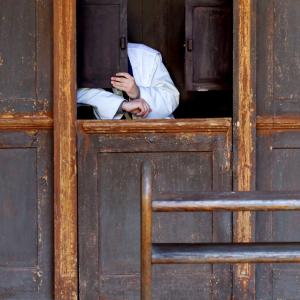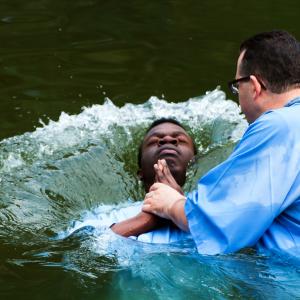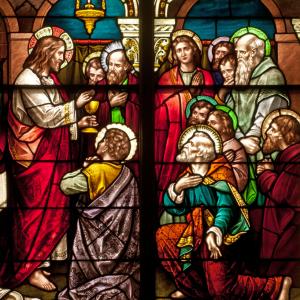
Jason Byassee is pastor of Boone United Methodist Church in Boone, N.C., and a fellow in theology and leadership at Duke Divinity School. He holds the Butler chair in homiletics and biblical hermeneutics at the Vancouver School of Theology in British Columbia.
Posts By This Author
Living the Word: Jesus and His Weird Friends
Reflections on the Revised Common Lectionary, Cycle A
THE CHURCH'S CALENDAR always sits at odds with the world’s. In the world, the season of light is Christmas. And that’s long since gone by now. But in the church, the season of light is Epiphany, when God gives us a glimpse of all the strange people who will be drawn to Jesus. We gentiles rejoice. Jesus is bringing all his weird friends over for dinner. So maybe there’s space at the table even for us.
Think of every dark place in our world. Every frightened child. Every violated person. Every victim of war or hunger. The darkness growls with endless hunger. Epiphany says this: God’s light will shine and swallow up that darkness and make all things into unending day. Hopefully God will do that sooner rather than later—through our efforts, through the church, through our elected officials. But if not, God will bring the kingdom Jesus preached, one day. And there will be unending light for those who’ve faced the most darkness.
Epiphany is a good season in which to concentrate on the church—Jesus and all his weird friends. The lectionary showers us with stories from Matthew and the psalms and Corinthians about how odd and distinctive this community is. Ministers have the inestimable privilege of serving God’s people. What joy! What light! What a marvel is the church of Jesus Christ.
[ February 5 ]
Now and Not Yet
Isaiah 58:1-12; Psalm 112:1-10; 1 Corinthians 2:1-16 ; Matthew 5:13-20
CHRISTIANITY IS A religion of grace. We don’t get what we deserve, thank God. We get so much more. And being people of grace, we try to show forth God’s mercy in our life together—to show the world it is made and sustained in existence by a good, good God.
The Keyhole of Repentance
Reflections on the Revised Common Lectionary, Cycle A
THERE IS SOMETHING SPACIOUS about the gospel viewed through the keyhole of repentance. Something to the spare, Spartan spaces that mark a season of penitence. One chapel I know turns its altar so the people can see Jesus’ dying words: “I thirst.” Another adorns its sanctuary with a bare tree, not a leaf on it. The signs are those of severity. We make a hash of this world. We leave it bare. There is no health in us.
Lent says the tree will not always be bare. We will not always be health-less. And Jesus will not always thirst. Augustine of Hippo says Jesus thirsts for those gathered around him—he longs to drink them in, make them part of his body. That is, Jesus’ own murderers, the oblivious passers-by, his fellow convicts (his own disciples are long gone).
Lent is long. If you’re like me or my church, our Lenten devotions have grown a bit tepid by now. These final weeks are good times for renewal. The first weeks of Easter, in the ancient church, were a time when the newly baptized would gather daily to marvel at the wonders of their new faith. So too can we.
It’s been a year of strange happenings, politically and culturally. Our inclination is to lash out. There is plenty of blame to be distributed. Lent asks us to lash in. We are the first at fault, whoever we are. And then to praise. Try though we might, we cannot stop the Lord of life. And neither can anyone else.
An Avalanche of Fire
Reflections on the Revised Common Lectionary, Cycle A

piosi / Shutterstock.com
SUMMER IS ALMOST HERE, and churches ... slow ... down. Folks are planning for vacation. Staff are away. Pastors are away. It’s as if we take our status as middle-class bourgeoisie more seriously than our baptismal vows.
By contrast, in the summer the biblical texts pick up—in intensity, directness, drive. Pentecost falls on us like an avalanche of fire, teaching us languages we don’t know, names, places, people. The old joke is that war is God’s way of teaching geography to Americans. No, in the church, that would be Pentecost. The descent of the Holy Spirit empowers people to preach who most say shouldn’t (in our texts that includes Arabic-speakers, women, unnamed prophets), and confounds those of us who think we “should.” Then Trinity Sunday, and all three persons of the triune Godhead are on the stage. We now know God as fully as God can be known by mere creatures. What we can’t know is not because God is tragically removed or far away. No—it’s precisely because God has come so unbearably close and is so unimaginably beautiful. That’s why we can’t take all of God in. So we praise instead of merely examine. And then Jesus sends out the disciples in mission to do what he does, or even greater things. Teach. Heal. Exorcise. Baptize. This doesn’t sound like a summer vacation or even a mission trip. It sounds like a new way of being in community for others.
That’s what the church is, in summer or anytime.
Living the Word: The Light Dawns Slowly
GIVEN THAT WE'VE ALL just had a face full of Christmas lights, most folks would be surprised to learn that in the church, Epiphany is traditionally the season of light (not lights—you can put them away). Epiphany is designed to put us in the position of those who first met Jesus on whom light slowly dawns. What? You mean the carpenter’s son, Mary’s boy? He’s the one to redeem Israel and bring justice to every last human being on earth?! There is so much light here it is hard to see all at once. Epiphany acts as a light dimmer, waiting for our eyes to adjust, trying to keep us only slightly uncomfortable, but not overwhelmed.
Some churches have a practice of announcing a sermon series for January that can attract new people—something on sex or politics, for example. Advertise it at Christmas and then deliver with your best in the new year. That’s when folks are open to new things, and best of all for us, God illumines us at Epiphany. Learning who God is throws light on who our neighbor is—one in whom divine light shines, who is therefore endlessly deserving of our respect and adoration.
Back with My Heart
Reflections on the revised common lectionary, Cycle A.
THIS IS WEIRD, I know, but I miss Lent when it’s over. There is something to what Otis Moss III calls the “blue note preaching” that feels human and humanizing. So much of life is sorrowful. At Lent we can name that sadness explicitly. Don’t get me wrong—Easter is awesome. But as soon as it’s done and the lilies are put away and the crowds diminish, I miss the strong scrubbing brush on our corroded hearts and the promise of God’s unending mercy.
There is a clarity in Lent. Repent! Turn around! Now! This is not at all a negative message. When we repent, we empty ourselves, pour ourselves out, open ourselves up. We are normally so full of self-regard. As a friend of mine says, “I’m always right.” What? “I mean, if I knew something was a lie, I’d stop thinking it.” Donald Trump couldn’t have said it better. The thing is, we all think we’re right all the time. Lent says, “No you’re not. Whoever you are.” Sarah Coakley’s work brilliantly has shown the good news of what scripture calls “kenosis,” self-emptying. This is a dangerous teaching. Women and minorities and people out of power are often abused by being told to make themselves less. Coakley argues that self-emptying in forms such as silent prayer is actually the most empowering thing we can do. Because then God’s Holy Spirit fills us up. Grants us a power we can’t imagine. Makes us fully human.
So repent away, preachers and friends. There is no better piece of good news around.
[ March 5 ]
God Tumbles After Us
Genesis 2:15-17, 3:1-7 ; Psalm 32; Romans 5:12-19, 13-17; Matthew 4:1-11
What Are We Baptized For?
Reflections on the Revised Common Lectionary, Cycle A
THE WEEKS AFTER EASTER have always been especially important. Think of the first Easter—the bewildered disciples spent seven weeks being taught by a crucified and resurrected person. It must have been amazing, slightly unbelievable, then gone too soon. In the ancient church, Easter was a time for the newly baptized to immerse in the church’s odd and distinctive teachings. We dunked you—and then told you what that means. First Peter was originally a baptismal manual, a guidebook on the way to being the sort of peculiar people God wants (1 Peter 2:9). We do well during this month to look for extra opportunities for teaching. What does it mean to be baptized into a dead-and-alive-again person?
One thing it means in our own strange days is to craft creative ways to care for God’s beloved poor. We are experiencing a shredding of our country’s social safety net. Say whatever you like about it politically—the reality is there are more poor in more need. Someone is going to have to help. Why not us? It’s commanded in our Bible and our church’s heritage. There will be more of them, trust me. Our neighbors will notice and get curious about this Jesus about whom we teach. God desires a people of mercy who adore the poor, who treasure creation, who notice the dignity in every single human face. Not because it’s nice. But because God has a human face.
[ May 7 ]
Sacred Sheep?
Acts 2:42-47; Psalm 23; 1 Peter 2:19-25; John 10:1-10
Confessions of a Former White Supremacist
A conversation with a former neo-Nazi who's learned that there's life after hate.
TONY McALEER TELLS a story about one of the other founders of Life After Hate, a nonprofit dedicated to helping people leave neo-Nazi and other extremist groups. McAleer’s colleague was being served at McDonald’s by an elderly African-American woman who saw the swastika tattooed on his hand. She looked at him, and said, “Oh honey, you’re so much better than that.”
That seed germinated for years until the man left white nationalism and dedicated himself to helping others leave.
“The hardest thing in the world is to have compassion for those who have no compassion,” McAleer told Sojourners in an interview in his native Vancouver, British Columbia. “But those are the people who need it the most.” And given the number of such people attracted to such ideas in the wake of a certain presidential election, we all need pointers in how to deter folks from the fringes of what is now called the alt-right and what was once called neo-Nazism.
Living the Word: Extravagant Kindnesses
Reflections on the Revised Common Lectionary, Cycle C.
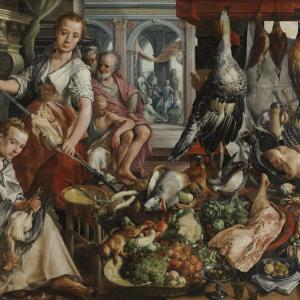
Everett - Art / Shutterstock
THE “DOG DAYS” OF SUMMER refers to more than the weather. Attendance in churches is often down due to travel. The energy level is low, with students away and families scarce. The church year tends to gear up with the academic one, to peak with Christmas, to peak again with Easter, and then to peter out into the summer. How do we stay invigorated? How do we energize our faith with the zeal of the psalmist: “Come and see what God has done: God is awesome in deeds among mortals” (Psalm 66:5)?
I challenge churches to do something different with the summer—turn the dog days into an excuse to take risks. “Something different” will differ with context. Try a dialogue sermon. Answer live tweets from the youth. Preach a sermon entirely in the interrogative mood—nothing but questions or one that, like the psalms, is addressed solely to God. Invite testimonies about faith and service. Invite mentors who inspired you into ministry to offer their story during worship or Bible study. With the elections coming, talk about how the church has engaged with politics through history—and don’t leave out the bad stuff. Immerse yourself and your community more deeply in the gospel for the renewal of your life together, always an aspect of church and worship.
Summer is often a season of travel and meeting strangers. Remember that Abraham and Sarah offered extravagant kindness when they met three strangers in the desert. How can we become known, like Abraham, as “the friend of strangers”?
[July 3]
A Livable Faith
Isaiah 66:10-14; Psalm 66:1-9; Galatians 6: 1-16; Luke 10:1- 11, 16-20
ST. AUGUSTINE describes breast milk as a sign of the goodness of God. Who would dare say he’s wrong? It’s so there—abundant, nurturing, creating intimacy. It’s like God with all of us. But Augustine isn’t being original here. Isaiah is. God is a nursing mother, Israel is a nursing child, and both are happy with one another.
Eugene Peterson has made a career of insisting on the “livability” of scripture. We can do this stuff—with a healthy dose of the Spirit’s power. Coastal Church, a Pentecostal congregation in downtown Vancouver, made Luke 10 a sort of constitution for its life together. Rather than preach or protest at people, it has made a point of visiting people’s homes (already difficult in an age that loves privacy). They offer blessing. They ask what hurts and pray for it. They eat together. And they speak of the reign of God. The church has grown, lonely neighbors find surprising friends, and the reign is manifest.
Living the Word: The Language of the Market?
Reflections from the Revised Common Lectionary, Cycle C

-strizh- / Shutterstock
MOST OF OUR HOLY DAYS have been colonized. The commercialization of Christmas and Easter is not quite evil, but it is certainly an obstacle to deepening one’s faith.
Pentecost, however, we have all to ourselves. No one has figured out how to market it, perhaps because we Christians have so deemphasized it compared to our other great feasts. The Holy Spirit has sometimes been spoken of as the “shy” person of the Trinity. She’s always pointing to Jesus. The Spirit is fine to let Jesus have all the attention.
But what a feast to have all to ourselves! One in which all nations are drawn to worship Zion’s God. This flood of peoples is long promised in Israel’s scripture and is now made good by Christ’s Spirit.
North American culture continues to wrestle with racial politics. William Barber speaks of these days as a Third Reconstruction, after prior ones that arrived with Emancipation in the 1860s and the civil rights movements in the 1960s. This Third Reconstruction era includes #BlackLivesMatter, immigration, and struggles for citizenship wrestling against the demagogic, bloviating “No!” of politicians.
In all this, Pentecost says, “Yes.” I’m tempted to say “quietly,” but this yes is not quiet. It’s a hurricane. It’s followed by a sermon all listeners can hear in their own language. Even if the disciples can’t speak all those languages, God can. God made all nations. God called Israel to be God’s light and bride. And now, through Jesus, God is drawing all God’s beloved peoples again. The church must show this in our life together.
And (don’t forget this!) those from all nations have to die to ourselves and be raised in Christ’s image. God is speaking, church! All we have to do is join in.
Living the Word: Easter: The New Normal?
Reflections on the Revised Common Lectionary, Cycle C.
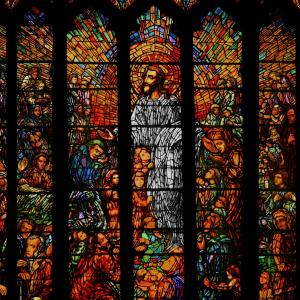
CURAphotography / Shutterstock
THE SUNDAY AFTER EASTER we all take a breath. We’ve worked hard to offer our best for Easter. Ministers often have had to preach more than our accustomed once a week. Choirs have gone all out. The sanctuary has been cleaned and decorated and trampled upon and cleaned again. Worship services may even have been lively and full. Now, as the Easter season settles in, all goes back to normal. We gather these Sundays not for spectacle, but for the risen Christ, refracted off the faces of one another.
The lectionary readings send us into unfamiliar territory. During these days, there’s not an Old Testament reading in sight—the book of Acts functions as the history of God’s faithfulness. Revelation tears a hole where Paul usually is. The gospel texts speak to the unbearable newness of a risen Lord reorienting the world around himself.
In the ancient church, those baptized at the Easter vigil would first be stripped naked before going under the water. They then donned a new robe as a sign of “putting on” Christ—and wore it throughout the Easter season. They went to church daily, learning what it meant to be “in Christ.” Had they ever seen a baptism before attending their own? Had they ever shared in Eucharist until they tasted one? I wonder whether the Easter season can be a new normal. Not one where we settle for the ordinary, but one where we take part in the risen Christ’s wrapping of all reality around the empty tomb.
Living the Word: Between a Rock and Arising
Reflections on the Revised Common Lectionary, Cycle C

totajla / Shutterstock
These weeks are the high point of the Christian year. They are also taxing for those who are preachers. The Sundays seem to come around every few minutes, while liturgies fly at you even faster during Holy Week. All the more important, then, to dine on the Word ourselves, before we feed others from what we’re cooking. Thankfully, the church has set aside the richest texts we have to describe the mystery that is beyond describing—that God is in Christ reconciling the entire world. Often we can’t even reconcile—piece together—our own lives! Let alone our families, churches, communities. Thankfully, we don’t have to. God already has. Our work is announcing what’s been completed and enjoying its fruits.
The liturgies of Lent, the Passion, and Holy Week are what seep deep into people’s bones. Our words bring to light what God is already doing. Make use of these. Have worship on Wednesday to wash feet and on Maundy Thursday to join in Jesus’ inauguration of the Lord’s Supper. Do like the African-American church has done and invite people to gather for three hours on Good Friday to hear seven sermons. Gather like the Orthodox and the Catholics at dawn on Easter, light a fire, and have folks process into church carrying the light of Christ and singing. It’s a week of revival, as evangelicals put it. God isn’t just resurrecting Jesus. God’s stitching the church back together—and the universe too.
[March 6]
Dereliction and Duty
Joshua 5:9-12; Psalm 32; 2 Corinthians 5:16-21; Luke 15:1-3, 11b-32
You could live with each of these texts every moment left in your life and never exhaust them. They have an accent on forgiveness, grace, and celebration. This is already odd in Lent—a season in which, traditionally, we train ourselves not to say “hallelujah” so that it will ring out all the sweeter on Easter when our lips curl around its contours for the first time in weeks. Israel’s disgrace is “rolled away,” as the word “Gilgal” announces (Joshua 5:9). Happy are we when our “sin is covered” (Psalm 32:1), when God is our hiding place. And Christ is reconciling every atom in the universe—and more miraculously still—entrusting us (us!) with God’s ministry of reconciliation (2 Corinthians 5).
Luke 15 is more staggering still. It is often misnamed “the prodigal son.” But as Tim Keller and others have pointed out, it is the father who is most extravagant here. The father, as if he dies to himself, gives the younger son his inheritance. Then, when the younger son returns, the father celebrates with what is left (presumably cutting into the elder’s share). The younger son’s depth of dissolution would have drawn a reflexive shudder from the story’s first readers (Pigs! Akin to, say, roaches for us). And the elder son is just as lost as the younger—he just has a better strategy for getting the father’s stuff by dutifully waiting for dad’s death. Better, that is, until he runs headlong into his father’s rule-transcending generosity.
Living the Word: Why Do Good Things Happen?
Reflections on the Revised Common Lectionary, Cycle C.

Ray Bond / Shutterstock
LENT IS A GIFT. It is a hard scrub brush for when we’re covered with grime that won’t come off in an ordinary bath.
Lent is popularly associated with “giving up” things. This giving up is easy to lampoon. When I gave up meat once, a friend said, “If you want to go on a diet, don’t pretend you’re doing it for Jesus.” Lent is a remarkably ineffective season for weight loss. Every Sunday is a celebration of the resurrection, so Sundays aren’t technically days of Lent. On Sundays you can indulge as much as you want. It’s not the best diet plan. But it does remind us that resurrection crowns every week and so every fast.
Lent is our minor participation in Jesus’ 40-day fast, which is itself a participation in Israel’s 40-year sojourn in the wilderness. It’s meant to be hard (a friend who loves to fast says he gives up fasting for Lent!). In Lent we say “no” to just a few of our desires. This is counter-cultural in a Western world bent on saying “yes!” to every consumerist desire, however bizarre. But these little “no’s” are really geared to help us say “yes” to Jesus more. It might hurt at first, especially if we’re not used to it, like every good habit. And in the gospel’s strange economy, saying no is the way to life.
[February 7]
A Face Alight
Exodus 34:29-35; Psalm 99; 2 Corinthians 3:12- 4:2; Luke 9:28-43a
YOU'VE SEEN FACES shine before. Think of the radiant pregnant woman. Think of a speaker or an athlete or a dancer in a groove, performing like few can. Think of those few moments in life so magical you can’t stop smiling.
Moses’ face shines so brightly his fellow Jews ask him to cover it. He’s in the presence of a light so incandescent it has been known to kill people. Moses’ face is like the light of the moon—a reflection of a greater light on which we cannot look directly.
If Moses’ face shines, Jesus’ whole body shines. So does the mountaintop all around. Moses turns up to join in the shine, along with Elijah, and they discuss the “departure” or “exodus” (Luke 9:31) that Jesus will soon accomplish at Jerusalem.
Living the Word: Is There a Crack in Everything?
Reflections on the Revised Common Lectionary, Cycle C.

The Len / Shutterstock
THE YEAR IS YOUNG AGAIN. Folks are making soon-to-be-broken New Year’s resolutions. Why not preachers? Resolved: Prepare to preach far enough in advance that the Holy Spirit has some time to work with me. Preachers I admire sketch an entire year out in advance. Pastor Ken Shigematsu at Tenth Church in Vancouver, B.C., suggests that we’re creative on 10-day cycles. So he begins working in earnest on a sermon 10 days before he preaches it. Whatever system you come up with, resolve not to preach “Saturday night specials.” Sure, the adrenaline is nice, but it’s as hard to be creative on demand as it is to be intimate on schedule. That way, when you have a brilliant insight you can see that it fits, say, 10 weeks from now, and that insight is not lost if it fails to live up to the demands of a sermon to be preached in 10 hours.
Epiphany is one of our best, most underutilized words. The chapel at our seminary is blessedly named Epiphany chapel. For no actual connection to God happens in preaching without the illuminating light of the Spirit. I like to preach through the old hymn “We Three Kings” at least once during Epiphany. It reminds us who God is: God is born in our flesh, hailed as prophet and as king, and will die at our hands. Especially during an election year in the United States, when many ridiculous things will be said about God, we do well to remember these particular claims about who God is.
Living the Word: The Crash of Joy and Sorrow
Reflections on the Revised Common Lectionary, Cycle C.

jorisvo / Shutterstock.com
ONE OF THE BEDROCK assertions of the Christian faith is that the kingdom of God is coming.
Jesus announced God’s reign, and embodied it, and brought it among us, but it is not here yet in full. The world’s brokenness and our own selfishness are testament enough that the kingdom is not here in full. But it is coming. And there’s not a thing we can do to hurry it, or stop it, or even delay it. We can, however, join in with it. That’s the best recipe for how to be a human being.
Advent’s reliable annual return is like the kingdom in its future certainty. The blue or purple paraments, the hymns in minor key, the candlelight, the longer nights—they all return, annually, like an old friend. Advent is a season of longing. The church places herself in the position of Israel, crying out for a savior. The hymns express this longing (“O Come Emmanuel, and ransom captive Israel, that mourns in lowly exile here”). Some churches have a “longest night” service on or around Dec. 21 for those who have experienced especially acute grief in the past year. Advent reminds us that life is not all cheerfulness, as if we needed reminding. It’s also sorrow, longing, waiting, and hoping.
Then Advent returns, ready or not. Just like Jesus and the reign he’ll soon bring in full. It’ll be here before you know it. And it’ll amplify the best parts of human life. It will shear off the worst parts. And it will make the world the one God dreams about.
Living the Word: Goodness in the Face of Evil
Reflections on the Revised Common Lectionary, Cycle B

DarZel / Shutterstock
The gospel messes with your tenses and moods (among other things)
Living the Word: In The Cool of God's Shade
Reflections on the Revised Common Lectionary, Cycle B

Dr Ajay Kumar Singh / Shutterstock
THE DOG DAYS OF SUMMER can make for a preaching desert without an oasis in sight. This can be a fine time to take a vacation from the lectionary. Huge swaths of scripture go untreated otherwise—the entire Samson cycle, most of the cursing psalms, most of the gospel of John. One friend spends a portion of every year preaching through blockbuster movies and how they intersect with the scriptures. Another devoted a preaching series to favorite children’s books.
Here in August the lectionary itself seems to take a vacation, visiting the discourse about bread in John’s gospel, inviting us to see every bit of bread, every bite of food, as filled with Jesus. Texts about water invite us to see all water as a sign of the God who creates us in the water of a womb and gives water for our salvation in baptism (an especially apt teaching point for those still sandy-toed from the beach).
A friend’s pulpit has on it “tree of life,” written in Hebrew—inviting all to see trees as reminders of the tree from which our first parents ate fruit forbidden to them, the tree on which Jesus was crucified, and the tree in the City of God whose leaves are for the healing of the nations.
The Soulful Bells of Summer
Reflections of the Revised Common Lectionary, Cycle B
THE SEASON AFTER Pentecost is a challenge. Some churches call it “ordinary time.” This is where most of our life is lived, spiritually speaking. The fact that other churches call it “the season after Pentecost” reminds us that a miraculous tongue of fire is needed for any sermon to work—and the Holy Spirit has a tongue of fire for us. Pentecost propels us through ordinary time. The Holy Spirit can take as sorry a lot of losers as the ones Jesus chose as disciples and turn them into apostles, martyrs, world-changers. God has always done more with less-promising material.
A retreat at a monastery gave me a glimpse of what ordinary time means. By the time 8 a.m. Mass rolls around, we’ve already been in church three times that day. Mass is beautiful, we leave buoyantly, the Trappist monks are nearly chatty. Then the bell rings. It’s time for Terce, another hour of prayer. That bell sets me to sighing—weren’t we just in church? Terce is like the Sunday after Easter or Christmas—a letdown. Same building, half full of people, and with a quarter of the energy. And it is precisely then that it’s important to worship God. The church’s worship of God carries on when we’ve all gotten bored or tired. Such worship is good for souls. Preachers’ souls included.
A Recipe for 'Greater Works'
Reflections of the Revised Common Lectionary, Cycle B
BY THIS TIME in the church calendar, the liturgical highlights feel like they’ve slowed considerably. The excitement of Easter is gone, not to be replaced by another holy season until Advent. Pastors and parishioners, who all stayed away the week after Easter, hopefully have returned. The holy days seem to have drained away into the season of counting the weeks, depressingly named as “ordinary time.”
Ecclesially speaking, however, the holy days are amping up considerably at this point. Easter season hits a crescendo with these latter weeks. The ascension of Christ used to be marked as one of the greatest feast days of the year, up there with Easter, Christmas, and Pentecost. It signifies Christ’s rule over all things, hidden now, to be full-blown and publicly obvious to all in God’s good time. Christ himself insists that he must go away in order that the Advocate would come and, in John’s language, to enable us to do even “greater works” than Jesus ever did. Pentecost is a new outpouring of the triune God to empower the church to do those greater works. There is much here to be celebrated. A crescendo, not a tapering off.
These texts present a reign inaugurated with resurrection in which the poor eat and are satisfied. One built on friendship and common love. It suggests a God who likes getting born enough that God decided to go through the experience and told the rest of us we should go through it all over again. Is that bodily enough for you?
Easter and a Love Supreme
Reflections on the Revised Common Lectionary, Cycle B
DURING THE EASTER SEASON, the first reading in our lectionary becomes, strangely, a New Testament reading. Most of the year, we immerse ourselves in the scripture we share with the Jews, but after the resurrection we traipse through the book of Acts. The claim being made is that the history of God’s chosen people continues in the history of the church. God is still working signs and wonders. And these include the sharing of goods in common, the fact that there are no needy people among us, bringing awe and distress among our neighbors, and a dawning kingdom brought slightly closer. Just like in our churches and communities today, right?
These Easter texts are also deeply sensual and material. God’s reign is imagined as a banquet with rich wines and marrow-filled meats. Love between sisters and brothers is like oil running down the head, over the face. The resurrection texts themselves insist on this point more emphatically than any other: Jesus is raised in his body. This is the beginning of God’s resurrecting power breaking out all over the creation God loves. What could ever be impossible after a resurrection? Our limited imaginations of the possible (Can we make budget? Can we get a few more votes on this bill? Can we improve lives in this neighborhood?) are shown for the bankruptcy in which they are mired. A new order is here. We pray, God, make our imaginations match the sensuousness, the materiality, the grandeur of what you have already accomplished and, more daringly still, what you promise yet to do.
Lent's Lonely Road
Reflections of the Revised Common Lectionary, Cycle B
ONE OF THE UNANTICIPATED effects of our health-care technologies is that we expect to live relatively pain-free lives, physically speaking. In the West, we do not imagine a physician saying to us “this will hurt” before cutting in. We expect to be anesthetized to avoid pain. In the same way we struggle with a biblical pathway to God, like Lent.
In Lent, we put ourselves on a lonely road with Jesus—40 days in the wilderness, struggling with hunger, thirst, loneliness, doubt, fear. In Lent, we put ourselves in a 40-year journey in the wilderness with the people Israel, wondering when, if ever, God will make good on the promises of a land flowing with milk and honey. In Lent, we do business with repentance.
Whatever else the church may say about repentance, we certainly say, “This will hurt. And not just a little.” Repentance means “turning around.” It also means dying, biblically speaking. We are drowned in baptism and raised to new life; we go to extremes in the wild until an entire generation dies off (the exodus) and until we are reduced to one searing set of emotions (the crucifixion). Jesus’ cross wasn’t light. Why should we expect ours to be?
Then there’s the good news. A resurrection is on the far side of that cross. Its blinding light pours around the edges of the stone rolled before the tomb. Resurrection is not in Lent, but it’s coming. In the meantime, in the words of John the Baptist, “Prepare the way.”

